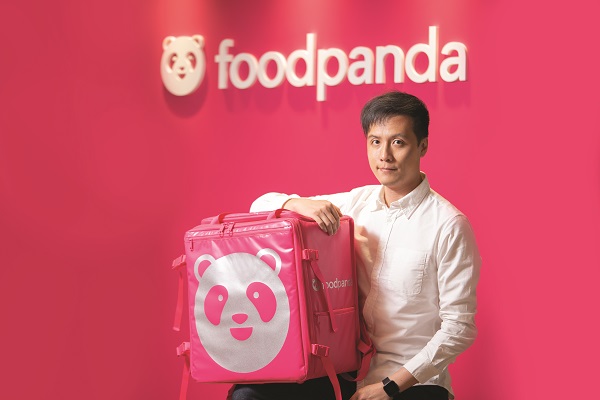In Asia,quick commerce has greatly accelerated over the past two years, with the onset of the pandemic, and in Hong Kong, the consumers have always wanted to experience convenience and speed in this space. There was also a growing need for more variety, as consumers spent more time at home due to movement restrictions and began to have higher expectations of their delivery services. Tapping into this demand, Foodpanda Hong Kong, launched ‘Pandamart’ two years ago, pioneering a move into the
o the quick commerce space. Since then, other brands have entered the category including Deliveroo, Nosh, Nutrition Kitchen, Black Sheep Go Delivery and Uber Eats.
“Over the past few years, there has been rising demand from consumers to get goods delivered immediately. As e-commerce started to mature in Asian markets, consumers expected a much shorter delivery time,” Ryan Lai, managing director of Foodpanda Hong Kong, told Inside Retail.
Over the last year, Pandamart’s turnover recorded a 53 per cent increase, reflecting the strong demand for q-commerce from Hongkongers.
The Sai Ying Pun store recorded the highest order values, growing by around 144 per cent compared to the same period last year, making it the most popular store among all Hong Kong districts.
Two years on, there are currently 20 stores servicing 17 out of 18 districts in Hong Kong. The Hong Kong food delivery scene currently has companies like Deliveroo, Nosh, Nutrition Kitchen, Black Sheep Go Delivery and Uber Eats all competing for this lucrative market.
In a related development, Foodpanda recently opened its regional headquarters in Singapore. It houses 1,200 employees from its regional and local operational teams, plus the company’s global tech hub.
Changing needs
Customers are now demanding fresher ingredients, as more are embracing healthier lifestyles. Foodpanda is meeting this need by introducing more varieties by partnering with local farms to offer a range of organic vegetables and fruits.
According to Lai, the demand for fresh ingredients in the second quarter of 2022 increased by 119 per cent, while the number of orders for local organic ingredients and fresh vegetables also grew exponentially by 370 per cent and 73 per cent, respectively.
To address seasonal demands, the company has also expanded its range of chilled wines and desserts. Orders for spirits and wines increased by 64 per cent last year, while orders for ice cream and desserts recorded a 100 per cent increase.
“Leveraging a hyperlocal business model, and advanced technology and operations, we continue to expand our q-commerce offerings to bring greater convenience, accessibility, and choice to Hong Kong consumers,” Lai added.
Keeping up with trends
Consumers in Hong Kong have always valued quality products and services, and Foodpanda noticed that its clientele were leaning more towards local products and independent businesses.
Lai said that the brand has been committed to supporting grassroots enterprises, and the team has been working closely with local brands to source high quality products from Hong Kong.
“To further enhance this, we recently added a new category on our app, “Made in Hong Kong”, where customers can easily find their favourite local products. This includes premium local soy sauce from Yuet Wo and natural handcrafted nut butters from The Nutter.”
A partnership with vegetable farm, Zen Organic, and sustainable fish farm, Local Aquaculture, has also been instrumental in ensuring more fresh produce options for customers.
Seasonal needs and wants
Limited edition products tied to the Lunar New Year and the Mid-Autumn Festival are always popular among Hong Kong consumers. Interest in these products is also heightened if these products are made by homegrown brands.
Last year, the company partnered with Chili Lab, a local chilli sauce maker, to launch the Lunar New Year special gift box exclusively on Pandamart. Their products are all homemade with a special family recipe.
“Not only is the sauce the perfect companion for Chinese dishes, but the brand also echoes family values that are celebrated during Lunar New Year,” said Lai.
For the Mid-Autumn Festival last year, Foodpanda partnered with a local bakery brand, Patisserie La Lune, and a local coffee label, Artista Perfetto, to offer exclusive gift sets highlighting local craftsmanship.
“This Lunar New Year, we continued the tradition and collaborated with another homegrown brand, Wing Lok Noodle Factory to amplify the local culture.”
Diversification is key
According to Lai, the company also launched catering services early last year, due to increased demand as the pandemic meant more families chose to stay home to celebrate.
“We now collaborate with more than 150 catering outlets, from local restaurants to professional catering service providers, to offer a variety of menus and cuisines for parties, festivals and other special occasions,” he said.
The Foodpanda team has been working closely with the fleet community and local partners to create more efficient operations and provide a smoother and more convenient service for its customers.
Interestingly, sustainability is also another critical focus of the company as it grows in the Hong Kong marketplace.
“We connect with local non-profit organisations like the Foodlink Foundation to redistribute surplus food to people in need, we also work with the Waste Picker platform to pass free cardboard and boxes to the waste pickers for recycling,” Lai concluded.

